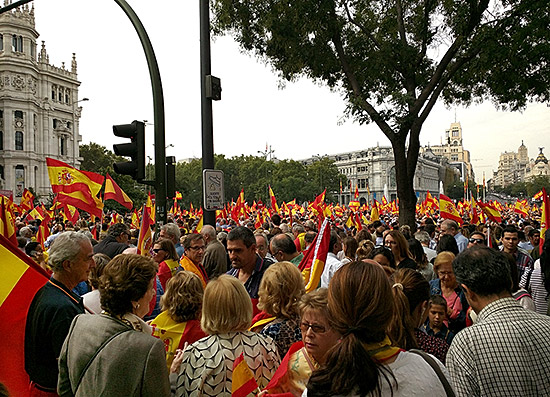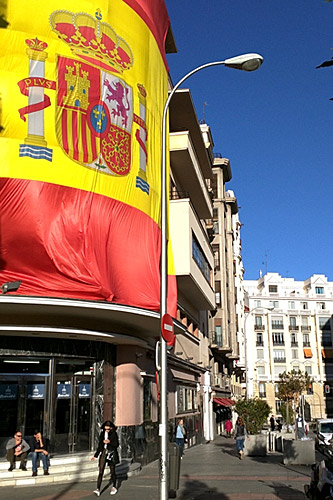“So what’s going on in Catalonia?” ask U.S. of A. conocidos. The region declared independence from Spain last month. Friends are curious.
I offered my two cents in a July post, will today pitch in another penny. Cautiously. I live in Madrid, hear mostly Madrid’s side of the conflict.
(♦) Separatist front lines are in Barcelona, almost four hundred miles northeast of my home in Spain’s capital. Barcelonans contend with strikes, mass protests, business flight. Not me. I stumbled across the large pro-unity protest shown below in late September, now expect to frequently see window-draped Spanish flags while strolling sidewalks. Day-to-day life is otherwise unaffected.

(♦) No one has sounded surprised by the conflict. Exasperated, yes. Irritated, occasionally. Surprised? No. Spain weathered ten months without a government in 2016, the aftermath of the Great Recession, crises a-plenty before. Natives do not expect smooth sailing of the Spanish ship of state.
(♦) In five separate conversations this summer, Madrileños claimed that the Catalan school system propagandizes the young to be pro-independence. (A gripe echoed in recent articles in El País and El Mundo.) One local pointed to language laws promoting Catalan fluency in Catalan government employees, and said that such legislation helps stack the civil service deck with rah-rah separatists.
(If I want to hear the separatist counter-argument, I’ll have to ride an AVE to Barcelona to get it. I ain’t gonna get it here now, at least not easily.)
(♦) I occasionally still query new acquaintances for their views on Catalonia, but carefully take their measure first, and tread on tip toes. Not a safe subject for elevator chit-chat, at least not in the autumn of 2017.
(♦) Lucky you get a quick, incomplete primer on Spanish flags in the news:
Center, above: the national flag, now often displayed to champion pro-Spanish-unity, anti-Catalan-independence sentiments. Center, right: L’Estelada, a de facto symbol of Catalan independence. Center, left: the innocuous Senyera, official flag of the Catalonia community.
A rally with many national flags + Senyeras = a pro-unity rally, probably in Catalonia. Rally with many L’Esteladas = pro Catalan independence. Rally with national flags + L’Esteladas = potential street fight.
(♦) I don’t know what’s going on here. I can remember names, dates, events, but don’t feel the involved issues in my bones as I would had I grown up on Spanish soil. I sense that the conflict and the deliberate display of the country’s flag have awakened a defiant nationalist pride among some Madrileños, but do not see the big picture, can’t understand this pride in the larger context of things. I see Spain as an American expat, from the outside looking in.
In the states, the national anthem protests are the latest chapter in centuries-old racial conflict. I grew up with that conflict, believe I see it as other born-and-raised Americans do, from the inside looking out. It comes with the U.S. territory, won’t go away anytime soon. Americans unhappy to live alongside the conflict should consider trips in time machines for heart-to-heart talks with America’s forebears: it might have helped a whole hey of a lot if they hadn’t jammed millions of Africans into slave ships and held their descendants under thumb for centuries afterward.

A few Spaniards have sounded incredulous while recounting glimpses of that racial conflict during tourist forays to the U.S. They didn’t get it, just as I don’t get unrelated but similarly entrenched problems in Catalonia.
A language exchange intercambio partner offers to explain the independence movement, bewilders me by beginning not with Lluís Companys or even the Siege of Barcelona, but — my God! — with the Battle of Guadalete, Covadonga, Barcelona counts. I read about the Spanish Civil War, stumble across a quote from Francoist José Millán Astray: Catalonia and the Basque Country are two cancers in the body of the nation! I don’t get it. I know he was as partisan as they come, but I don’t understand the Zeitgeist that produced him, why anyone would ever have wanted to say such a thing.
Politicians want to put out fires. In their shoes, I suppose I would, too. They always have too much to worry about. (Like a drought.) Make the problem go away. Get it off the front page.
The December 21 elections may kick the Catalan conflict off the front pages in 2018. But, one way or the other: more than forty percent of Catalans don’t want to be Spanish citizens. Un lío, for the long term.
